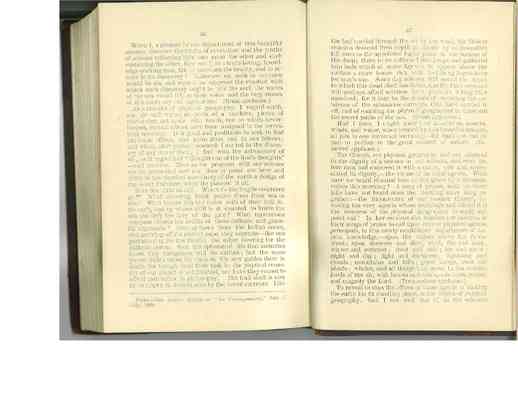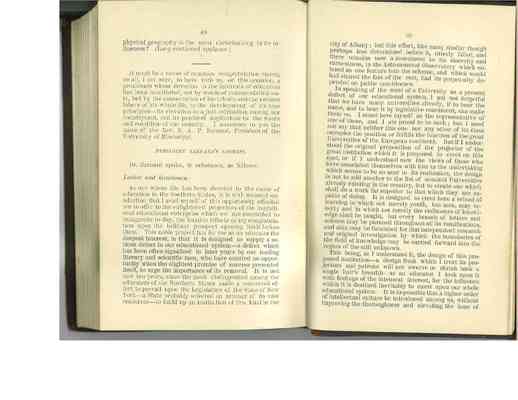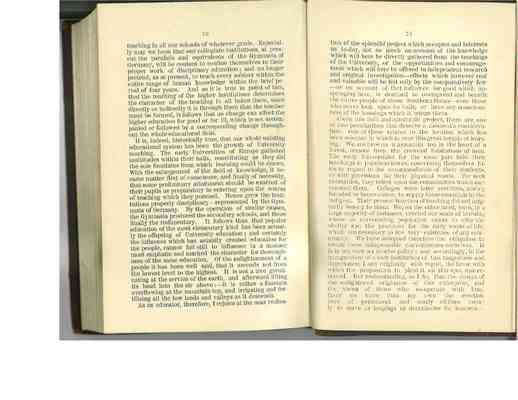Pages
146
62
edge and most persevering labor can avouch, is brought here to that end; and the most liberal bounty--the most magnificent benevolence that ever illustrated a people's virtue, have added large stores of material treasure.
Now, my countrymen, under God we owe this, first to the Spirit I have endeavored to elucidate, and then to the earnest, enlightened devotion of this noble band of holy men. They have given their gifts to this enterprise of Christian patriotism I cannot praise them with fulsome eulogy, I cannot discriminate their work, but you, and the world, and they, will feel I am not much to blame if I turn to you, Reverend Sir, and say, as the Roman Historian said of Alexander's conquest of the East, "He took courage to despise vain apprehensions," and farther, that when it pleaseth God, your Master, to stay your radiant and strong right arm from His battlefields on earth, and call you to share His everlasting triumph, the Heavens and your grateful country will read on your grave-stone, "THE FOUNDER OF THE UNIVERSITY OF THE SOUTH."
And to all of you, Reverend Fathers, in the name of our common country, and of our posterity, I may use the language of the wisest statesman and purest patriot of Rome, apostrophising the wisest teacher--save one-vouchsafted to man--
"O Socrates, et Socratiei viri! Nunquam vobis gratiam Referam."
And again I may hail you, Venerable Fathers of our beloved Church, in the triumphant cry of one whose successors you are in your holy office, and brave and meek and holy as he was, whose equal you would be, if Liberty and Religion demanded the trial--"Be of good comfort; we shall this day light such a candle, by God's grace, as I trust, never shall be put out."
-----------
I feel peculiar pleasure in introducing to you a distinguished fellow-citizen, whose labors in the cause of
63
science have crowned his name with honor throughout the world, and made him, in a measure, the property of nations. The winds of Heaven and the waves of the sea, have, by his researches and discoveries, been made tributary to the increase of the facilities of trade to every land, and on every sea where commerce spreads her sails. I announce to you the name of my friend, Commander Matthew F. Maury, of Washington City.
COMMANDER MAURY'S ADDRESS.
Ladies and Gentlemen:
This greeting, and the terms in which my old preceptor* and early friend has brought me into this presence, fill me with emotions difficult to utter. I thank you for your goodness.
Physical geography makes the whole world kin. Of all the departments in the domains of physical science, it is the most christianizing. Astronomy is grand and sublime; but astronomy overpowers with its infinities, overwhelms with its immensities. Physical geography charms with its wonders, and delights with the benignity of its economy. Astronomy ignores the existence of man; Physical geography confesses that existence, and is based on the Bibilical doctrine that the earth was made for man. Upon no other theory can it be studied; upon no other theory can its phenomena be reconciled. The astronomer computes an ephemeris for his comets; predicts their return; tells the masses of the planets, and measures by figures the distance of stars. But whether stars, planets, or comets be peopled or not, is, in his arguments, theories and calculations, of no consequence whatever. He regards the light and heat of the sun as emanations--forces to guide the planets in their orbits, and light comets in their flight-nothing more. But the physical geographer, when he warms himself by the coal fire in winter, or studies by the light of the gas burner at night, recognizes in the
----------------------------------------------------------------------------
*Bishop Otey.
147
64
light and heat which he then enjoys the identical light and heat which came from the sun ages ago, and which with provident care and hands benignant have been bottled away in the shape of a mineral and stored in the bowels of the earth for man's use, thence to be taken at his convenience, and liberated at will for his manifold purposes.
Here in the schools which are soon to be opened, within the walls of the noble institution which we are preparing to establish in this wood, and the corner-stone of which has just been laid, the masters of this newly ordained science will teach our sons to regard some of the commonest things as the most important agents in the physical economy of our planet. They are also mighty ministers of the Creator. Take this water (holding up a glass full,) and ask the student of physical geography to explain a portion only of its multitudinous offices in helping to make this earth fit for man's habitation. He may recognize in it a drop of the very same which watered the garden of Eden when Adam was there. Escaping thence through the veins of the earth into the rivers, it reached the sea; passing along its channels of circulation, it was conveyed far away by its currents to those springs in the ocean which feed the wind with vapors for rains among these mountains. Taking up the heat in those southern climes where otherwise it would become excessive, it bottles it away in its own little vesicles. These are invisible, but rendering that heat latent and inocuous, they pass the sightless couriers of the air through their appointed channels, and arrive here in the upper sky. This mountain draws the heat from them; they are formed into clouds, and condensed into rains, which coming to the earth make it "soft with showers," causing the trees of the field to clap their hands, the valleys to shout, and the mountains to sing. Thus the earth is made to yield her increase, and the heart of man is glad.
Nor does the office of this cup of water in the physical economy end here: it has brought heat from the sea in the southern hemisphere to be set free here for the regulation of our climates; it has ministered to the green plants and given meat and drink to man and beast. It
65
has now to cater among the rocks for the insects of the sea. Eating away your mountains, it fills up the valleys, and then loaded with lime and salts of various minerals, it goes singing and dancing, and leaping back to the sea, owning man by the way as a task master; turning mills, driving machinery, transporting merchandise for him; and finally reaching the ocean, it there joins the currents to be conveyed to its appointed place, which it never fails to reach in due time with food in due quantities for the inhabitants of the deep, and with materials of the right kind to be elaborated in the workshops of the sea into pearls, corals, and islands--all for man's use.
Thus the right-minded student of this science is brought to recongize in the dew drop the materials of which He who "walketh upon the wings of the wind" maketh his chariot. He also discovers in the rain drop a clue by which the Christian philospher may be conducted into the very chambers from which the hills are watered.
I have been blamed by men of science, both in this country and in England, for quoting the Bible in confirmation of the doctrines of physical geography. The Bible, they say, was not written for scientific purposes, and is therefore of no authority in matters of science. I beg pardon: the Bible is authority for everything it touches. What would you think of the historian who should refuse to consult the historical records of the Bible because the Bible was not written for the purposes of history? The Bible is true; and science is true. The agents concerned in the physical economy of our planet are ministers of His who made both it and the Bible. The records which He has chosen to make through the agency of these ministers of His upon the crust of the earth are as true as the records which by the hands of His prophets and servants He has been pleased to make in the Book of Life. They are both true; and when your man of science with vain and hasty conceit announces the discovery of disagreement between them, rely upon it the fault is not with the Witness or His records, but with the "worm" who essays to interpret evidence which he does not understand.
9
148
66
When I, a pioneer in one department of this beautiful science, discover the truths of revelation and the truths of science reflecting light one upon the other and each sustaining the other, how can I, as a truth-loving, knowledge-seeking man, fail to point out the beauty, and to rejoice in its discovery? Reticence on such an occasion would be sin, and were I to suppress the emotion with which such discovery ought to stir the soul, the waves of the sea would lift up their voice and the very stones of the earth cry out against me. (Great applause.)
As a student of physical geography, I regard earth, sea, air and water, as parts of a machine, pieces of mechanism not made with hands, but to which nevertheless, certain offices have been assigned in the terrestrial economy. It is good and profitable to seek to find out these offices, and point them out to our fellows; and when, after patient research I am led to the discovery of any one of them, I feel with the astronomer of old, as though I had "thought one of the God's thoughts" --and tremble. Thus as we progress with our science we are permitted now and then to point out here and there in the physcial machinery of the earth a design of the Great Architect when He planned it all.
Take the little nautili. Where do the fragile creatures go?* What directing hand guides them from sea to sea? What breeze fills the violet sails of their frail little craft, and by whose skill is it enabled to brave the sea and defy the fury of the gale? What mysterious compass directs the flotilla of these delicate and graceful argonauts? Coming down from the Indian ocean, and arriving off the stormy cape they separate--the one part steering for the Pacific, the other steering for the Atlantic ocean. Soon the ephemeral life that animates these tiny navigators will be extinct; but the same power which cared for them in life now guides them in death, for though dead their task in the phycial economy of our planet is not finished, nor have they ceased to afford instruciton in philosophy. The frail shell is now to be drawn to distant seas by the lower currents. Like
-----------------------------------------------------------------------------------
NOTE.--See Lucion Bubois in "Le Correspondant," 25th of July, 1860.
67
the leaf carried through the air by the wind, the lifeless remains descend from depth to depth by an insensible fall even to the appointed burial place on the bottom of the deep; there to be collected into heaps and gathered into beds which at some day are to appear above the surface a store house rich with fertilizing ingredients for man's use. Some day science will sound the depth to which this dead shell has fallen, and the little creature will perhaps afford solution for a problem a long time unsolved; for it may be the means of revealing the existence of the submarine currents that have carried it off, and of enabling the physical geographer to trace out the secret paths of the sea. (Great applause.)
Had I time, I might show how mountains, deserts, winds, and water, when treated by this beautiful science all join in one universal harmony,--for each one has its part to perform in the great concert of nature. (Renewed applause.)
The Church, ere physical geography had yet attained to the dignity of a science in our schools, and even before man had endowed it with a name, saw and appreciated its dignity,--the virtue of its chief agents. What have we heard chanted here in this grove by a thousand voices this morning?--A song of praise, such as these hills have not heard since the morning stars sang together:--the BENEDICITE of our mother Church, invoking the very agents whose workings and offices it is the business of the physical geographer to study and point out! In her services she teaches her children in their songs of praise to call upon certain physical agents, principals, in this newly established department of human knowledge,--upon the waters above the firmament; upon showers and dew; wind, fire and heat; winter and summer; frost and cold; ice and snow; night and day; light and darkness; lightning and clouds; mountains and hills; green things, trees and plants; whales, and all things that move in the waters; fowls of the air, with beasts and cattle,--to bless, praise, and magnify the Lord. (Tremendous applause.)
To reveal to man the offices of these agents in making the earth his fit dwelling place, is the object of physical geography. Said I not well that of all the sciences
149
68
physcial geography is the most christianizing in its influences? (Long continued applause.)
------------
It must be a cause of common congratulation among us all, I am sure, to have with us, on this occasion, a gentleman whose devotion to the interests of education has been manifested, not by words of commendation only, but by the consecration of his talents and the earnest labors of his whole life, to the development of its true principles--its elevation to a just estimation among our countrymen, and its practical application to the wants and condition of our country. I announce to you the name of the Rev. F. A. P. Barnard, President of the University of Mississippi.
PRESIDENT BARNARD'S ADDRESS.
Dr. Barnard spoke, in substance, as follows:
Ladies and Gentlemen:
As one whose life has been devoted to the cause of education in the Southern States, it is with unusual satisfaction that I avail myself of this opportunity afforded me to offer to the enlightened projectors of this magnificent educational enterprise which we are assembled to inaugurate to-day, the humble tribute of my congratulation upon the brilliant prospect opening itself before them. This noble project has for me as an educator the deepest interest, in that it is designed to supply a serious defect in our educational system--a defect which has been often signalized in later years by our leading literary and scientific men, who have omitted no opportunity when the slightest promise of success presented itself, to urge the importance of its removal. It is not now ten years, since the most distinguished among the educators of the Northern States made a concerted effort to prevail upon the Legislature of the State of New York--a State probably selected on account of its vast resources--to build up an institution of this kind in the
69
city of Albany; but this effort, like many similar though perhaps less determined before it, utterly failed, and there remains now a monument to its sincerity and earnestness, in the Astronomical Observatory which eutered as one feature into the scheme, and which would had shared the fate of the rest, had its perpetuity depended on public munificence.
In speaking of the want of a University as a present defect of our educational system, I am not forgetful that we have many universities already if to bear the name, and to bear it by legislative enactment, can make them so. I stand here myself as the representative of one of these, and I am proud to be such; but I need not say that neither this one nor any other of its class occupies the position or fulfills the function of the great Universities of the European continent. But if I understood the original proposition of the projector of the great institution which it is purposed to erect on this spot, or if I understand now the views of those who have associated themselves with him in the undertaking which seems to be so near to its realization, the design is not to add another to the list of nominal Univestities already existing in the country, but to create one which shall do a work far superior to that which they are capable of doing. It is designed to erect here a school of learning to which not merely youth, but men, may resort; and in which not merely the rudiments of knowledge shall be taught, but every branch of letters and science may be pursued throughtout all its ramifications, and aids may be furnished for that independent research and original investigation by which the boundaries of the field of knowledge may be carried forward into the region of the still unkown.
This being, as I understand it, the design of this proposed institution--a design from which I trust its projectors and patrons will not swerve or shrink back a single hair's breadth--as an educator I look upon it with feelings of the intensest interest, for the influence which it is destined inevitably to exert upon our whole educational system. It is impossible that a higher order of intellectual culture be introduced among us, without improving the thoroughness and elevating the tone of
150
70
teaching in all our schools of whatever grade. Especially may we hope that our collegiate institutions, at present the parallels and equivalents of the Gymnasia of Germany, will be content to confine themselves to their proper work of disciplinary education; and no longer pretend, as at present, to teach every subject within the entire range of human knowledge within the brief period of four years. And as it is true in point of fact, that the teaching of the highter institutions determines the character of the teaching in all below them, since directly or indirectly it is through them that the teacher must be formed, it follows that no change can affect the higher education for good or for ill, which is not accompanied or followed by a corresponding change throughout the whole educational field.
It is, indeed, historically true, that our whole existing educational system has been the growth of University teaching. The early Universities of Europe gathered multitudes within their halls, constituting as they did the sole fountains from which learning could be drawn. With the enlargement of the field of knowledge, it became matter first of conscience, and finally of necessity, that some preliminary attainment should be exacted of their pupils as preparatory to entering upon the course of teaching which they pursued. Hence grew the institutions properly disciplinary--represented by the Gymnasia of Germany. By the operation of similar causes, the Gymnasia produced the secondary schools, and these finally the rudimentary. It follows thus that popular education of the most elementary kind has been actually the offspring of University education; and certainly the influence which has actually created education for the people, cannot fail still to influence in a manner most emphatic and marked the character for thoroughness of the same education. Of the enlightenment of a people it has been well said, that it ascends not from the lowest level to the highest. It is not a tree germinating at the service of the earth, and afterward lifting its head into the air above:--it is rather a fountain overflowing at the mountain top, and irrigating and fertilizing all the low lands and valleys as it descends.
As an educator, therefore, I rejoince at the near realiza-
71
tion of the splendid project which occupies and interests us to-day, not so much on account of the knowledge which will here be directly gathered from the teachings of the University, or the opportunities and encouragement which will here be offered to independent research and original investigation--effects which however real and valuable will be felt only by the comparatively few --as on account of that influence for good which upspringing here, is destined to overspread and benefit the entire people of these Southern States--even those who never look upon its halls, or have any consciousness of the blessings which it brings them.
About this bold and admirable project, there are one or two peculiarities that deserve a moment's consideration. One of these relates to the location which has been selected in which to rear this great temple of learning. We are here on a mountain top in the heart of a forest, remote from the crowded habitations of men. The early Universities for the most part held their teachings in populous towns, concerning themselves little in regard to the accommodation of their students, or with provisions for their physical wants. For such necessities, they relied upon the communities which surrounded them. Colleges were later erections, mainly founded by benevolence, to supply these essentials to the indigent. Their present function of teaching did not originally belong to them. We, on the other hand, have, in a large majority of instances, erected our seats of learning where no surrounding population exists to offer the shelter and the provision for the daily wants of life, which are necessary to the very existence of any community. We have accepted therefore the obligation to create these indispensable conveniencies ourselves. It is in my view an unwise policy; and accordingly, in the inauguration of a new institution of this magnitude and importance, I saw originally with regret, the favor with which the proposition to plant it on this spot was received. But understanding, as I do, that the design of the enlightened originator of this enterprise, and the views of those who co-operate with him, favor no more than my own the erection here of permanent and costly edifices merely to serve as lodgings or dormitories for learners-




